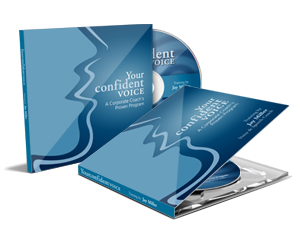Vocal Fry
Get Out of the Gravel
One of the qualities I look for, in a good voice, is clarity of tone. I want to hear a voice that's free of noise (e.g. breathiness, hoarseness, wheeziness). One of the most common sources of noise is vocal fry, or glottal fry. That's the slightly raspy, scratchy or gravelly quality that often sneaks in at the ends of phrases. It's called vocal fry, because it sounds a bit like food sizzling in a frying pan.
Tension, a lack of breath support—or both, usually cause vocal fry in the speaking voice. Speaking at a pitch that’s too low for the voice can also cause it. So you’ll often hear fry on downward inflection, when pitch falls below frequencies in the normal range.
Vocal fry is a common trait in the untrained speaking voice. While it's not considered pathology, it does have consequences for your effectiveness as a speaker. It causes your voice to feel irritated and fatigued over time. People find it difficult to listen to your voice due to the rough quality. And perhaps most importantly, you diminish the impact and effectiveness of your message, because the tone of your voice makes listeners feel you're pulling back and not fully committed to what you're saying. So how do you eliminate vocal fry in your voice?
The first strategy is, you guessed it, breathing. Learning to breathe deeply and fully before speaking, and releasing breath generously during delivery will provide power to engage your vocal folds fully and get rid of vocal fry. Just 15-20 minutes of coaching often noticeably increases tonal clarity. (Of course, such a brief period of exercise doesn't change the habits that created vocal fry in the first place.)
Another strategy for eliminating vocal fry is supporting the ends of phrases. As you approach the end of a phrase or sentence, your breath is tapering off and the inflection of your voice is dropping. All of that is quite natural, but those tendencies conspire to rob your voice of the energy needed to vibrate fully. As a result, words at the end of the phrase lose tone, get scratchy and sometimes become inaudible. Then listeners have a problem understanding what you've said. As you're speaking, notice whether your voice is as strong and resonant on the last word as it was on the first word. Make sure your listeners hear the last word as easily as the first.
Raising the pitch of your voice, very slightly, will often make your tone stronger and clearer, eliminating vocal fry. Your speaking voice operates a lot more efficiently in the middle of your range than it does at the bottom of your range. So practice starting sentences a tiny bit higher than your habit dictates. The change need not be noticeable to your listeners, but you'll feel a big difference. The funny thing is, you'll often get more deep resonance in your tone by moving into the middle of your range.
Start eliminating vocal fry by practicing breathing techniques, speaking in the middle of your range and supporting the ends of phrases. Your tone will improve, as well as the comfort and stamina of your voice. Best of all, as you engage your voice fully, you engage your self fully and ultimately engage your listeners.
 The Sound of Success
The Sound of SuccessEnroll in this FREE video mini course and discover a powerfully attractive voice.
 Your Confident Voice
Your Confident VoiceThis 145-minute mp3 download is a complete speaking voice course. The simple but amazingly effective program is on sale this month!
 Overcoming Stage Fright
and
Overcoming Stage Fright
andPerformance Anxiety
On this mp3 download, Jay Miller teams up with six-time award-winning hypnotist Dr. Mike Mandel to deliver the most comprehensive program available for reducing or eliminating stage fright.